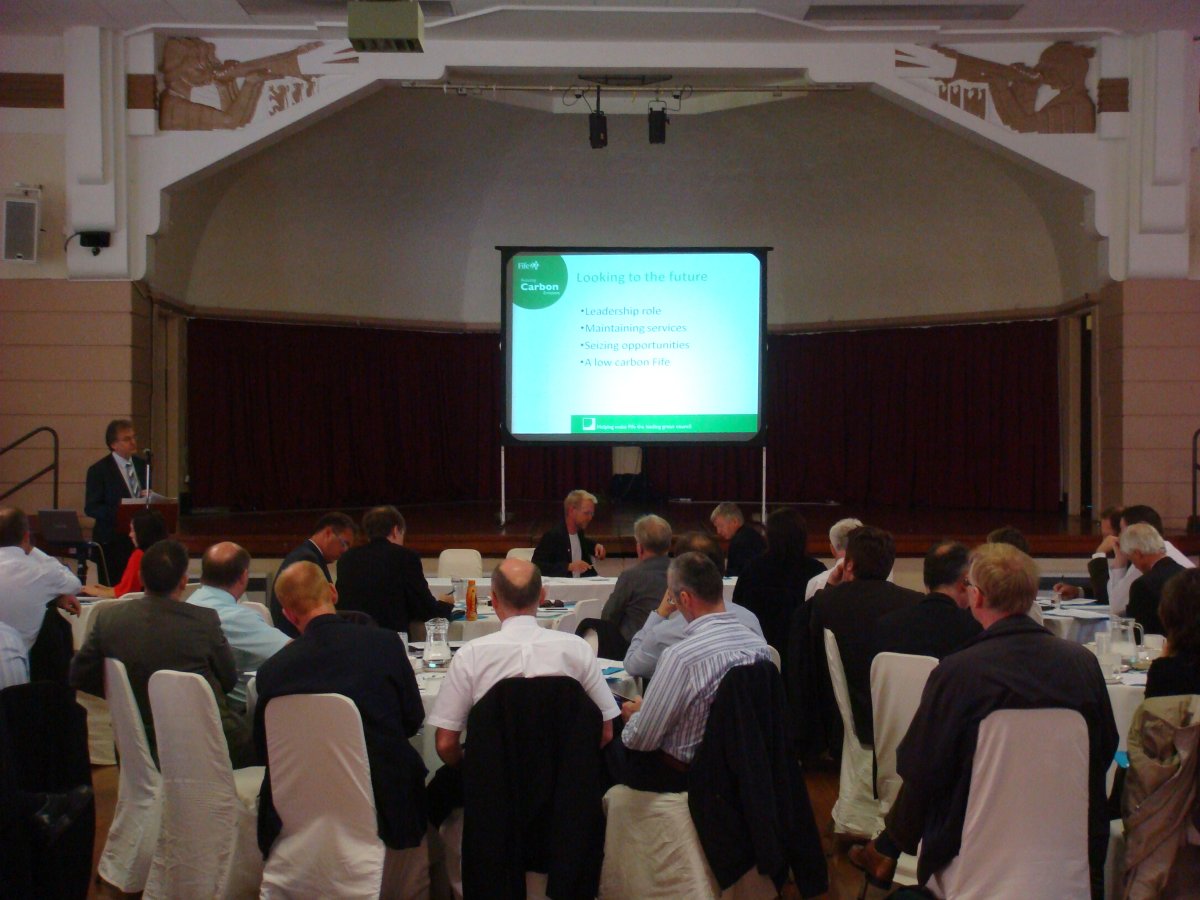
The Climate Change Act places new responsibilities on Scotland’s 32 local authorities and their public sector partners. Acknowledged as being the most ambitious in the world, these targets set Scotland apart and provide a benchmark for developed countries to follow.
An international seminar in Dunfermline on 10 September, which attracted representatives from 18 local authorities and environmental agencies including SEPA, Met Office and Scottish Natural Heritage, profiled the leadership actions by local authorities on climate change mitigation and adaptation.
The aim of the seminar was to outline the opportunities and challenges of the new Scottish Climate Change Act, the Scottish Climate Change Delivery Plan and the UN COP 15 Climate Change negotiations. It was acknowledged that while national governments and international bodies determine the targets for climate change, it is always local government at the forefront of implementation. There was consensus too that behavioral and culture changes lie at the heart of delivering targets and that public engagement is crucial as this can change the balance of policies.
Gavin Barrie, representing The Scottish Government, pointed out that Scotland is one of the few countries to take a strategic approach to adaptation and the hope is that the framework could be transferred.
Attendees heard from Fife Council about their investment in internal and external initiatives to address climate change and how they are striving to becoming the greenest council in Scotland. South Lanarkshire talked about the success of using the footprint method and Resources and Energy Analysis Programme (REAP) software as useful engagement tools and how this has encouraged dialogue with the developers.
The initiatives undertaken by these and other local authorities rely heavily on the support of other organisations. Sustainable Scotland Network (SSN) for example, plays an important role in bringing together local authorities to build capacity and share information. Revolving around their four priority areas; footprint, climate change, best value and procurement, SSN plan to deliver more dedicated training on pertinent issues.
The European perspective on climate change adaptation was profiled by local authorities from Holland and Sweden.
Vaxjo in Sweden has the enviable reputation as the greenest city in Europe! Having cut emissions by 35% since 1993 (a year-on-year fall of 2-3%), Vaxjo is approaching the 42% reduction target which Scotland has just signed up to. With the creation of new jobs, the city has seen increased economic growth. CO2 emissions have decreased and its citizens are now less vulnerable to fluctuations in energy prices. The opportunity for their society is that it is prepared to live without fossil fuels! There was a view that Vaxjo’s city-wide and regional stance and its control of critical infrastructure such as utilities were major contributing factors to its success. This was in sharp contrast to Scotland’s approach which is largely project based.
A new line of attack by the Dutch city of Tilburg was also showcased. There climate change strategy now includes mitigation and adaptation. In addition, the strategy has a multi stakeholder approach. Their new local plan has a vision of being carbon neutral by 2045 and the city is currently using the COP model to encourage co-operation across partnerships. In addition Tilburg has developed an energy covenant; an agreement between social housing associations and the municipality on energy objectives that are prioritized every three years.
Cllr Alison Hay of COSLA(The Convention of Scottish Local Authorities) summed up the general mood of the seminar. “It is important for local government to see ourselves as part of the global community and to identify how Scotland can contribute to the climate change agenda. We cannot continue to consume more than our fair share.”
A key message, suggested Ken Gibb of SSN, was the need to work to try to envision the future of Scotland in 2020 and beyond. “Nothing is excluded… including political arrangements.”
This was echoed by May East, Director, CIFAL Findhorn who added: “2009 is a crucial year in the international effort to address climate change. A series of UNFCCC meetings are taking place throughout the year, designed to culminate in an ambitious and effective international response to climate change, to be agreed at the United Nations Climate Change Conference (COP 15) in Copenhagen, 7-18 December.”

